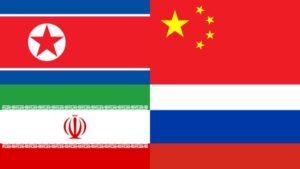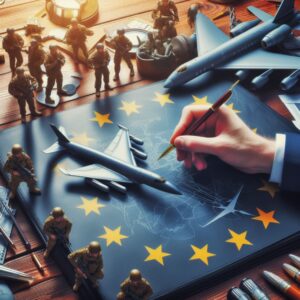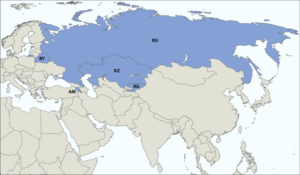At the end of February 2022, after the Russian invasion of Ukraine, Chancellor Olaf Scholz declared several actions for the reconstruction and strengthening of Germany’s armed forces, including a special investment fund of 100 Billion Euros for the armed forces.
Germany has a historical movement of distancing itself from military development by an international fear, on account of its tragic past of Nazism. Since the end of World War II, the country has become a protagonist in diplomatic and economic politics rather than focusing on armed interventions to achieve its goals.
This change in the German political line with the invasion of Ukraine will change the country’s position internationally and affect other countries. The internal and external reaction to this pronouncement of Scholz is divided and will imply several changes, mainly in the European Union.

Historical reasons why Germany was reluctant militarily and preferred to use its economic power as diplomacy
Since the end of the Cold War and World War II, Germany has become one of the main leaders of the diplomatic policy of international conflict resolution.
Because of its destructive past of German Nazism, the militarization of the country was no longer in the spotlight of investments, focusing much more on strengthening itself as an economic power than a military center.
However, the Russian aggression against Ukraine caused the new German Chancellor, Olaf Scholz, to change the country’s political tradition and take various actions within the military strengthening and defense.
With the history of Nazism, even though Germany is one of the main nations of the European Union, every advance in a policy of reconstruction and reform of the armed forces was poorly seen in the eyes of the population and the international community.
Recognizing the negative role they played in world history, the German army Bundeswehr was left aside, without investments and without much development by the German state, needing reforms of around 20 billion euros to modernize.
As a nation that advocated conflict resolution through diplomatic means of conversation and negotiation, Germany used its economic importance much more than the military to defend its interests.
But the tide is changing, or as they say in German Zeitenwende, after leaving a 16-year long government with the diplomat Angela Merkel and with a new and bold chancellor, the country heard its government representative position itself more strongly against Russia and Putin and declare that it will double investments in the armed forces, as well as various actions of military reconstruction.
What changed in the German military doctrine with the Russian invasion of Ukraine
With the increase of Russian pressure on the Ukrainian border, even before declaring the invasion, international pressure for a stronger German position against Russia also increased.
Several countries were already sending weapons and providing more resources to Ukraine’s armed forces, mainly the countries of the European Union. A few weeks before the declaration of Scholz, Ukraine and its officers were criticizing the lack of German support in the defense of the country, mainly because Estonia was in an action of sending cannons to Ukraine, which they had purchased from Finland but which were produced by Germany and which needed Germany’s approval for sending them.
This is because the German constitution preached neutrality in international conflicts and thus prohibited the export of German weapons to countries in conflictas in the case of Ukraine against Russia.
However, with the effective Russian invasion of Ukraine, Olaf Scholz resolved to change this German policy of military exemption announcing a series of changes in the armed forces to strengthen the national and international defense of their allies:
- Declared that 2% of the national GDP will be invested in the armed forces of Germany Bundeswehr, rising by 1.5%. Thus investing the minimum necessary for NATO member countries;
- Will create an investment fund of 100 billion euros (about US$112bn) directed to the armed forces, adding this policy within the National Constitution;
- Is discussing the construction of two Liquid Natural Gas ports, in partnership with the private sector and even with the company of billionaire Elon Musk, since the pipeline Nord Stream-2 coming from Russia is with suspended operations;
- Withdrew most economic transactions with Russia from the SWIFT trading platform;
- It will form partnership with France in the construction of fighter jets for the German army, in addition to armed drones;
- Will purchase new American F-35 fighter planes, which can carry nuclear weapons, used by several NATO member states;
- It will send 1000 anti-tank weapons and 500 missiles to Ukraine;
Besides all this, Germany is sheltering more than 10,000 Ukrainian refugees, saying that all these actions are in defense of democratic values and freedom.
As a way to calm possible criticism in this abrupt change in German military policy, Scholz said that “Not being naive means not talking simply for the sake of talking,” saying that Germany will not let its diplomatic protagonism die, but that it is necessary to position itself, even militarily, in relation to unjust wars.
The new chancellor also said that he will “defend every square metre of NATO territory”, that Germany will defend its allies and, unlike France which strengthens its army in order to use it in external operations, it sought to strengthen its armed forces to be used mainly for defense and not attacks.
This Zeitenwende in German politics brought criticism in the German Parliament since they observed Scholz’s action as independent and that it should have had more dialogue, mainly after a 16-year political stability with Merkel in power with a more cooperative form of politics.
Scholz needs to successfully implement his plans, in addition to incorporating them into an agenda with a larger political philosophy to ensure his approval with the German people and the international community. The German population is not opposed to the greater militarization of the country, even they were moving in favor of greater positions and greater relations with NATO in the defense of Ukraine.
The future trend of German militarization and its consequences for the European Union and the world
These actions directly affect the German economy, since a Russia supplies about 50% of the natural gas consumed in Germany. But they did not exit the search for a greater autonomy in energy production that the European Union was already putting in place, seeking to diminish Russian influence.
The countries of the European Union will be driven to strengthen militarily as well, since Germany has economic centrality in the union and will become the 3rd country with the largest military budget in the world. Especially in relation to Italy and France, two other main actors within the EU, these German expenditures will lead to a greater military strengthening of these countries.
Moreover, because of the European Union’s mutual defence policy, the importance of union in the regional military sphere will become more central, making Germany one of the main protagonists in the case of a future union of the European armed forces.
Relations between Germany and China will also undergo changes that will have consequences on the world stage. As Xi Jinping and Vladimir Putin have been strengthening political and economic ties, as much as Germany has important relations with China, the propensity is to diminish these relationships and invest more in developing countries.
The economic growth they were building up until then served to make Germany a world economic power. With these new investments in the military, Germany will also become a worldwide military potential.
Due to the aggressive German past that led to two major wars, this new militarization may leave some international actors apprehensive. However, today’s Germany is very different from early 20th-century Germany. It is one of the best and most vibrant democracies in the world with a high respect for human rights.
A new economically and militarily powerful Germany will be positive for the European Union in its quest for strategic autonomy and greater global influence and will also be positive for the world at large that seeks more democracies willing to have a stronger voice in the world.


日軍第731部隊旧址_PB121201-e1713902593308-300x224.jpg)









Be First to Comment